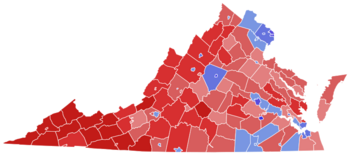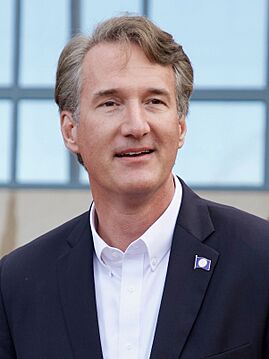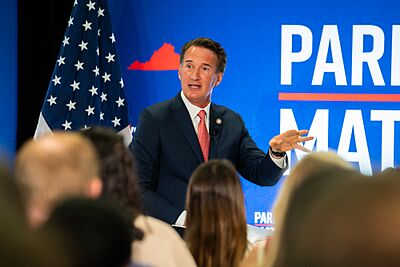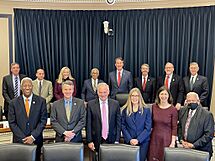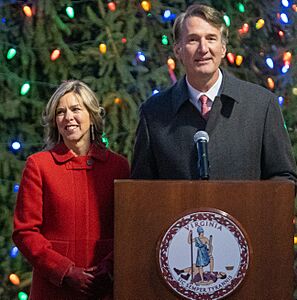Glenn Youngkin facts for kids
Quick facts for kids
Glenn Youngkin
|
|
|---|---|
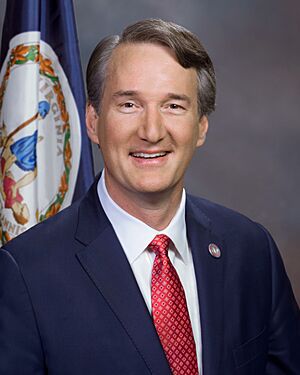
Official portrait, 2022
|
|
| 74th Governor of Virginia | |
| In office January 15, 2022 – January 17, 2026 |
|
| Lieutenant | Winsome Earle-Sears |
| Preceded by | Ralph Northam |
| Succeeded by | Abigail Spanberger |
| Personal details | |
| Born |
Glenn Allen Youngkin
December 9, 1966 Richmond, Virginia, U.S. |
| Political party | Republican |
| Spouse |
Suzanne Schulze
(m. 1994) |
| Children | 4 |
| Education | Rice University (BA, BS) Harvard University (MBA) |
| Signature |  |
| Website | |
Glenn Allen Youngkin (born December 9, 1966) is an American politician and businessman who served as the 74th governor of Virginia from 2022 to 2026. He is a member of the Republican Party. Before becoming governor, he worked for 25 years at a company called The Carlyle Group, where he eventually became a leader (co-CEO). He left his job in 2020 to run for governor.
As governor, Youngkin focused on topics like education, tax cuts, and the economy. He supported COVID-19 vaccination but was against rules that required people to get them. He also ended the rule that required masks in Virginia's public schools.
Because of term limits in the Virginia Constitution, Youngkin could not run for a second term in a row. He was succeeded by Democrat Abigail Spanberger, who won the 2025 Virginia gubernatorial election.
Contents
Early Life and School
Glenn Allen Youngkin was born in Richmond, Virginia, on December 9, 1966. His father played basketball for Duke University and worked in finance. His mother was a highly educated nurse and professor. When Glenn was a teenager, his family moved to Virginia Beach.
He went to Norfolk Academy, a private high school, and graduated in 1985. He was a talented basketball player and earned many awards. He went to Rice University on a basketball scholarship and played for the university's team for four years. He graduated in 1990 with degrees in managerial studies and mechanical engineering. Later, he went to Harvard Business School and earned a Master of Business Administration (MBA) degree in 1994.
Career in Business
After college, Youngkin started his career in finance. He worked for an investment bank called First Boston and a consulting firm named McKinsey & Company.
In 1995, Youngkin joined The Carlyle Group, a company that invests in other businesses to help them grow. This is known as private equity. He was very successful there and held many important jobs. He worked in London for a few years managing the company's team in the United Kingdom.
Over time, he was given more responsibility. He became the company's chief operating officer (COO) in 2011. In 2018, he was named co-CEO, which meant he was one of two people leading the entire company. He retired from The Carlyle Group in 2020 to focus on public service.
Running for Governor in 2021
In January 2021, Youngkin announced he would run for governor of Virginia as a Republican. He used some of his own money to help pay for his campaign. He won the Republican nomination in May 2021.
His opponent in the main election was the former Democratic governor, Terry McAuliffe. The campaign focused on many issues, including the economy and education. Youngkin held rallies called "Parents Matter" to talk about his ideas for schools. He said parents should have a bigger say in what their children learn.
One moment that got a lot of attention was during a debate. McAuliffe said, "I don't think parents should be telling schools what they should teach." Youngkin's campaign used this statement to argue that he would listen to parents more than his opponent would.
On November 2, 2021, Youngkin won the election. He became the first Republican to win a statewide race in Virginia since 2009. His victory was seen as a big success for the Republican party in the state.
Governor of Virginia (2022-2026)
Youngkin was sworn in as governor on January 15, 2022. He took office with Lieutenant Governor Winsome Sears and Attorney General Jason Miyares.
First Actions as Governor
On his first day, Youngkin signed eleven executive orders. Executive orders are official instructions from the governor. One order banned the teaching of what he called "inherently divisive concepts," like critical race theory, in schools. Critical race theory is an academic idea about how race has shaped laws and society, and it became a major topic of debate in politics.
Another order ended the statewide rule that required students to wear masks in public schools. He also ended the requirement for state employees to get the COVID-19 vaccine.
Education Policies
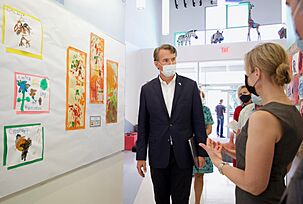
Education was a major focus for Governor Youngkin. He signed a bill that allows parents to review school materials and choose an alternative for their children if they find the content inappropriate.
His administration also created a plan for "lab schools." These are public schools run in partnership with colleges or universities to try out new ways of teaching. The state budget included $100 million to help start these schools.
In 2022, his administration also changed the state's model policies for how schools should work with students on issues of gender. The new policies focused on the role of parents in making decisions about their children's education and school life.
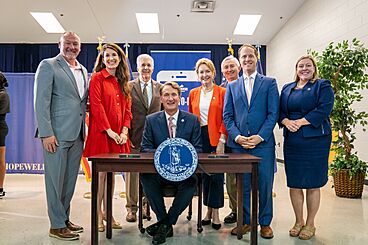
In 2024 and 2025, Youngkin signed orders that limited the use of cell phones in public schools during class time to help students focus on learning.
The Economy and Taxes
Youngkin signed a two-year state budget that included $4 billion in tax cuts. One of the biggest changes was increasing the standard deduction, which lowers the amount of income tax many people have to pay. The budget also removed the 1.5% state tax on groceries.
The budget also included a record $19.2 billion for education. This money was used to give teachers a 10% pay raise over two years and to help repair and build new schools.
Environment and Energy
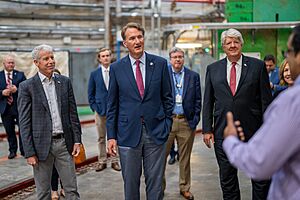
Youngkin supports an "all of the above" approach to energy. This means using different sources, including renewable energy like solar and wind, as well as natural gas and nuclear power. He proposed building a small nuclear reactor in Southwest Virginia.
He also took steps to pull Virginia out of the Regional Greenhouse Gas Initiative (RGGI). RGGI is an agreement between several states to reduce pollution from power plants. Youngkin argued that leaving the program would help lower electricity bills for Virginians.
Public Life and Political Work
During his term, Youngkin often campaigned for other Republican candidates across the country. He worked with leaders from other states and countries on issues important to Virginia. He also signed laws to make Virginia's voting process more secure, such as requiring voter rolls to be updated more frequently.
Personal Life
Youngkin and his wife, Suzanne, have four children. Before he became governor, they lived in Great Falls, Virginia.
In 2020, he and his wife started a nonprofit organization called the Virginia Ready Initiative. The group helps people who are unemployed find job training and new jobs.
Youngkin is very wealthy, with an estimated net worth of over $400 million from his business career. He promised to donate his governor's salary, which is $175,000 a year, to charity. He is also very tall. When he played college basketball, he was listed as 6 feet 7 inches tall.
Youngkin and his wife are religious and helped start a church called Holy Trinity Church in McLean.
Images for kids
-
Youngkin with Japanese Prime Minister Fumio Kishida in April 2023
-
Youngkin with Lieutenant Governor Winsome Earle-Sears and Attorney General Jason Miyares at the Executive Mansion in 2023
-
Youngkin with Maryland Governor Larry Hogan in January 2022
See also
 In Spanish: Glenn Youngkin para niños
In Spanish: Glenn Youngkin para niños
 | Misty Copeland |
 | Raven Wilkinson |
 | Debra Austin |
 | Aesha Ash |


